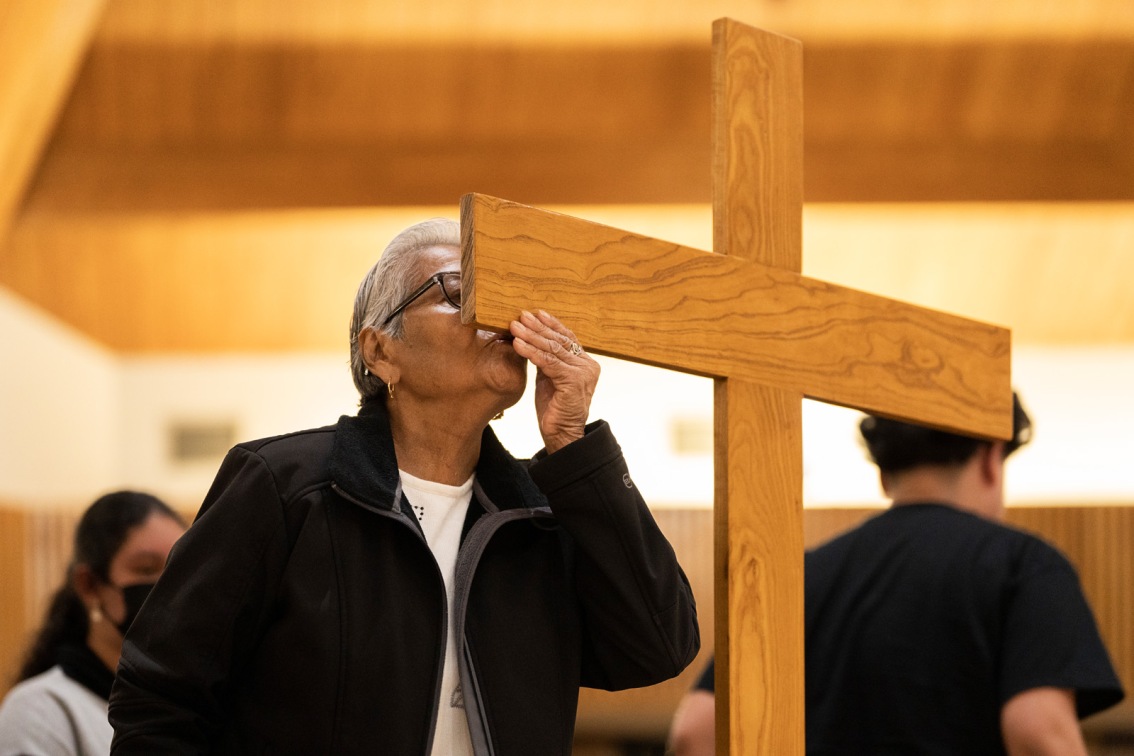Homily for Good Friday: Celebration of the Passion of the Lord
March 29, 2024
Saint Patrick Cathedral
Fort Worth, Texas
Isaiah 52:13-53:12
Psalm 31:2, 6, 12-13, 15-16, 17, 25
Hebrews 4:14-16; 5:7-9
John 18:1-19:42
The heart of the mystery of the Cross that we enter together as the Church of disciples and believers in Christ is the singlehearted love of Jesus Christ. His singleheartedness is seen in the unity of His human will with His Divine will in loving obedience to the Father, an obedience unto death. We see His singlehearted love as He stands silent before the duplicity of the Sanhedrin and the craftiness of Pontius Pilate and the other friends of Caesar. We see His singlehearted love in answering the high priest about the truthfulness of His Gospel and the transparent integrity of His life for which He is slapped and mocked. We see His single-hearted love as He entrusts His Mother, who possesses single-hearted devotion to Him, to the beloved Apostle and vice versa. Finally, we see His single-hearted love as He hands over His Spirit for the salvation of all and for each and every human being — universal and particular love.
Every world view, philosophy, and religion must say something to human beings about the experience of suffering and death, or else it has nothing to say. Without the Cross of Christ, we are left with meaninglessness in our suffering and meaningless in our lives. This meaninglessness without the Cross leads us to impose destructive ideologies that celebrate death and sin as the height of human freedom. The inevitability of death without reference to God drives us to the refusal to care for others who suffer, the compulsion to destroy suffering by killing those who suffer, blaming those who suffer for their own suffering. Without the Cross the deconstruction of humanity to raw barbarism — a state lower than the survival instinct of animals — is inevitable.
The message of the Cross to us and to the world of today is that God meets us through the single-hearted and loving obedience of Jesus Christ manifested fully in His selfless and loving victory on the Cross. His love is more precious than freedom from pain and that He is particularly close to us in our suffering and reminds us that we who are well are through single-hearted love directed to find Him in those who suffer among us.
In offering each of us a share in the mystery of Christ’s Cross, God offers all of humanity the capacity to love single-heartedly, rightly ordered to God and neighbor. The entrance into this mystery is not complete until we pass through death through judgment into eternal life, being delivered from every remnant of sin — the sin that crucified Christ. Joseph Ratzinger once wrote, “God’s glance is perceived wherever the heart is single, not divided between words for God and actions for ourselves, where it is undivided and makes itself available to God: that is where God is close to us, and that is where we can recognize that He is not an empty, consoling word, but a reality that enters into our lives.” That place is the Cross: the place of our suffering and the place of our sinfulness.
We can see ourselves in the person of Peter, especially but not only in the Passion account that we have just proclaimed. Peter desires single-heartedness and again and again he fails and refuses the opportunities for acting with singlehearted love for Christ. Peter proclaims that he will never deny Jesus and when the opportunity arises for him to carry out his stated commitment, he runs and hides, unable to let go of his own expectations and demands that the Messiah of God should be powerful on the world’s terms, more powerful than Caesar and Herod, gaining advantage for Peter in the glory of this fallen world in need of the true God. Peter neglects and denies the truth that Jesus is the answer to Peter’s duplicity of heart and all that is required is to act simply as a recipient of Jesus’ gift of Himself.
I was reminded earlier this week of a theological observation about Peter that accurately represents all of us who are baptized and confirmed members united as Christ’s Body, the Church. The fundamental tension in Peter’s life as seen in the Gospel accounts is that Peter is by birth Simon, but Christ calls him to be Peter. This fundamental tension is finally fused in Peter’s life through his martyrdom for singlehearted love for Jesus by his own crucifixion humbly received upside down. The fullness of Peter’s life from Simon to Peter attests to the true transformation by Christ of the Cross that changes it from an instrument of killing to the perfect means for loving. Is this not the truth of our own lives that brings us here today to the foot of the Cross with contrition for our duplicity. Yet, this is the consolation in our lives that we can receive in no other way but through our perseverant share in Christ’s Cross — the wood on which hung our salvation.

